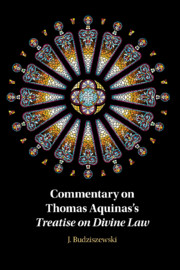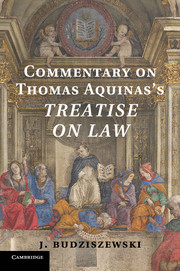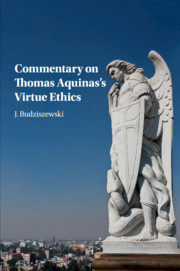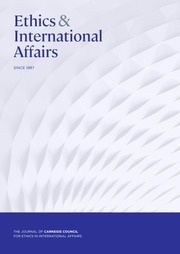Commentary on Thomas Aquinas's Treatise on Divine Law
$103.00 (C)
- Author: J. Budziszewski, University of Texas, Austin
- Date Published: April 2021
- availability: Available
- format: Hardback
- isbn: 9781108831208
$
103.00
(C)
Hardback
Other available formats:
eBook
Looking for an examination copy?
If you are interested in the title for your course we can consider offering an examination copy. To register your interest please contact collegesales@cambridge.org providing details of the course you are teaching.
-
Thomas Aquinas's classic Treatise on Divine Law is brought to life in this illuminating line-by-line commentary, which acts as a sequel to Budziszewski's Commentary on Thomas Aquinas's Treatise on Law. In this new work, Budziszewski reinvestigates the theory of divine law in Aquinas's Summa Theologiae, exploring questions concerning faith and reason, natural law and revelation, the organization of human society, and the ultimate destiny of human life. This interdisciplinary text includes thorough explanations, applications to life, and ancillary discussions that open up Aquinas's dense body of work, which tends to demand a great deal from readers. More than a half-century has passed since the last commentary on Thomas Aquinas's view of these matters. Budziszewski fills this gap with his consideration of not only the medieval text under examination, but also its immediate relevance to contemporary thought and issues of the modern world.
Read more- Provides a line-by-line commentary of Thomas Aquinas's Treatise on Divine Law (part of the Summa Theologiae)
- Makes the text accessible to students, scholars, and other readers without Latin
- Will have an unusually broad appeal for students and scholars of theology, philosophy, ethics, psychology, history, and the social sciences generally, and for all readers interested in the meaning and destiny of human life
Reviews & endorsements
‘This commentary on Aquinas's treatise on the Divine Law is a worthy and, indeed, indispensable sequel to the author's prequel, his successful commentary on Aquinas's Treatise on Law, in which the focus was law in general, eternal law, natural law, and human law. The sequel expands into a lucid treatment of the revealed divine law, old and new, in all its complexity. Directed primarily at those who study this demanding and difficult treatise for the first time but also instructive for the seasoned scholar, Budziszewski offers the first English-speaking commentary on the divine law in more than one generation. Clearly organized and lucidly written, this is an invaluable resource for every student of Thomas Aquinas, especially neophytes to Aquinas's thought, be they seminarians, undergraduate and graduate students, or the proverbial layperson who is looking for a reliable guide into Aquinas's teaching on the divine law.' Reinhard Huetter, Ordinarius Academician of the Pontifical Academy of St Thomas Aquinas
See more reviews‘Having already provided us with a complete commentary on Aquinas' treatise on natural law, J. Budziszewski here adjoins an accessible and nuanced analysis of Aquinas on the Old and New Law. The author directly engages with contemporary questions regarding the reasonableness of biblical revelation, its historical situatedness, the intellectual viability of its claims to uniqueness, and the challenges of its contemporary interpretation. In the spirit of St Thomas this is an impressive work of both reason and faith, philosophy and theology, one that contributes substantively to the Thomistic commentarial tradition. It serves as an important testimony to a culture of universal ethics that simultaneously bears the marks of a Christian conception of love.' Thomas Joseph White, Thomistic Institute
‘J. Budziszewski's Commentary on Thomas Aquinas's Treatise on Divine Law contains the best available commentary and introduction to this section of Summa theologiae. Budziszewski masterfully glosses Aquinas with insights that seasoned scholars will appreciate and a clarity that readers new to Thomas will cherish. If you want to understand what Thomas taught about divine law, you need to read this book.' Christopher Kaczor, Loyola Marymount University
‘J. Budziszewski's Commentary is an impressive achievement! It belongs on the shelf of every serious reader of Aquinas's treatment of law, politics, and justice. He has brought back a classic form of Thomistic scholarship – the commentary on Aquinas's Summa Theologiae – but with a thoroughly contemporary twist. He brings alive the issues at stake in Aquinas's texts, with an admirable clarity of exposition. It is both accessible to a newcomer and offers fresh insights to experts.' Dominic Legge, Thomistic Institute and the Pontifical Faculty of the Immaculate Conception
‘This brilliant commentary will be extraordinarily helpful not only to students, but to scholars – even seasoned readers of Aquinas who imagine that they already know his treatise on divine law. What is especially striking about Budziszewski's achievement is his ability to convey the spiritual serenity and reasonableness that characterize Aquinas's thought. Budziszewski captures these qualities through his own limpid and colloquial explanations, thereby bringing Aquinas's text to life.' Matthew Levering, Mundelein Seminary
‘J. Budziszewski has earned a reputation for scholarly excellence among serious students across several disciplines. His many published works further testify to his craftsmanship. Although he works as a professor of government and philosophy at the University of Texas, Budziszewski also enjoys standing among theologians. Scholars amenable to the thought of Saint Thomas Aquinas especially rely on Budziszewski's remarkable capacity to sum up complicated debates and doctrines. The present work fills a pressing need. One does not arrive easily or quickly at what Aquinas, whose name adorns Harvard Law School's walls (along with the great legal minds Harvard esteems), teaches about law. This book contains judiciously selected texts from Aquinas's works along with copious exegetical and explicative notes that open up his mind on divine law. A careful study of this volume will reward all readers, especially those who have been trained to think that laws are commands of human beings – only.' Romanus Cessario, O.P., Ave Maria University
‘J. Budziszewski's commentaries on Thomas Aquinas's Summa are the best I have ever read. Like each of his two earlier commentaries – on the Treatise on Law and on Aquinas' Virtue Ethics – this present volume on the Divine Law is as accessible to the novice as it is rich with insight for the scholar. In the insular worlds of academic philosophy and theology – especially among the disputing factions in the world of professional Thomism – it is rare to find a writer who has the ability to cut through the jargon while not losing an ounce of sophistication. For anyone who wants to explore Aquinas on divine law, I can not think of a better companion with which to take that journey than Budziszewski.' Francis Beckwith, Baylor University
‘J. Budziszewski has a rare talent for producing work that is simultaneously accessible and philosophically substantive, and thereby brings classic works and authors alive for a contemporary audience. Students and professors alike will read this commentary with profit.' Edward Feser, Pasadena City College
'Professor Budziszewski’s commentaries on Aquinas’ treatises are a unique resource. He is a friendly and expert guide to Aquinas’ text, method and world, putting us at our ease in what can seem a strange landscape, and empowering us to explore it further. He makes everything clear by explaining terms, unpacking arguments, and offering analogies. This commentary fills a long-standing gap, since Aquinas’ Treatise on the Divine Law is relatively neglected, yet is essential for understanding his teaching on Natural Law, on legislators’ tasks, and on the Spirit’s role in Christian life. It is an important part of the reception-history of the Bible. A knowledge of Aquinas’ positive attitude towards the Torah can contribute to Jewish Christian dialogue. Budziszewski has done an invaluable service to scholars, students and ‘interested amateurs’ of many backgrounds and many disciplines.' Richard Conrad, University of Oxford
Customer reviews
Not yet reviewed
Be the first to review
Review was not posted due to profanity
×Product details
- Date Published: April 2021
- format: Hardback
- isbn: 9781108831208
- length: 500 pages
- dimensions: 150 x 230 x 35 mm
- weight: 0.94kg
- contains: 2 b/w illus. 244 tables
- availability: Available
Table of Contents
Personal preface: on discovering Thomas Aquinas
Commentator's introduction
1. Was a divine law needed?
2. Does divine law come in one edition, or in two, old and new?
3. Were any of the old law's precepts moral?
4. Were any of the old law's precepts judicial?
5. Were the promises of benefits and threats of penalties appropriate?
6. Are all of the old law's moral precepts also included in the natural law?
7. Why does the old law contain just these moral precepts?
8. Were the old law's moral precepts appropriately formulated?
9. Can any exceptions be made to the old law's moral precepts?
10. Was it enough to obey the old law's moral precepts, or did they have to be obeyed in a certain way?
11. Did the old law's moral precepts have to be obeyed according to love or charity?
12. How are the moral precepts of the decalogue related to the old law's other moral precepts?
13. Did the moral precepts of the old law make man just and acceptable in the sight of god?
14. Were the old law's ceremonial precepts arbitrary, or given for intelligible reasons?
15. Reasons for old law judicial precepts about relations between citizens and rulers
16. Reasons for old law judicial precepts about relations among citizens
17. Reasons for old law judicial precepts about relations with non-citizens
18. Is the new law a written law, or is it poured into us?
19. Does the new law make men just and acceptable in the sight of god?
20. Is it appropriate that the new law includes not only precepts but also 'counsels'?
21. Afterword: Implications of St Thomas's teaching for the world of the present.
Sorry, this resource is locked
Please register or sign in to request access. If you are having problems accessing these resources please email lecturers@cambridge.org
Register Sign in» Proceed
You are now leaving the Cambridge University Press website. Your eBook purchase and download will be completed by our partner www.ebooks.com. Please see the permission section of the www.ebooks.com catalogue page for details of the print & copy limits on our eBooks.
Continue ×Are you sure you want to delete your account?
This cannot be undone.
Thank you for your feedback which will help us improve our service.
If you requested a response, we will make sure to get back to you shortly.
×




